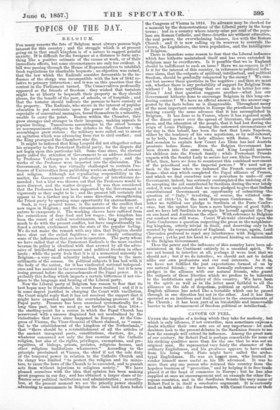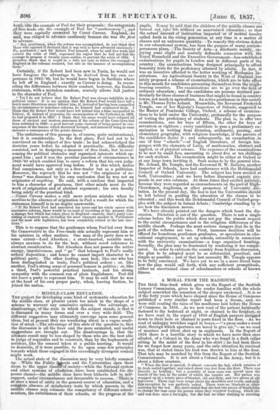CA - POUR ON PEEL.
UNDER the impulse of a feeling which they take for modesty, but which is only idleness, if not cowardice, men sometimes expressa doubt whether their own acts are of any importance : let such doubters look to the present debates in the Sardinian Senate to see how far example will extend its influence. Among the great men of our century, Sir Robert Peel is perhaps remarkable for none of his striking qualities more than for the one that he was not an original man. He represented very fairly the character of the ordinary Englishman, and his greatness appears to have arisen from his being what Plato might have called the archetypal Englishman. He was an honest man, 'who learned to render himself more useful as his life advanced. It was he more than any one person who released this country from the hopeless business of "protection," and by helping it to free trade placed it at the head of commerce in Europe; but he has also supplied at once an encouragement and an example for other European countries, and in the Sardinian Senate the very name of Robert Peel is in itself a conclusive argument. It is curiously used on both sides : the Free-traders, with Count Cavour at their .head, -cite the example of Peel for their proposals ; the antagonists „of tree trade cite the example of Peel for "cautiousness ; and they were capitally answered by Count Cavour. England, -he said, was obliged to advance cautiously because she was the first to advance, 6, But, gentlemen, when the reform was accomplished, do you think that 'those who opposed if declared that it was well to have advanced cautiously? gentlemen-;" and Sir Robert Peel himself, when he said free trade had calmed the crisis of 1847, expressed his regret that he had not had the :courage to propose it twenty years earlier, to prevent the crisis of 1824: I therefore think that it would be a folly not only to follow the example of England in the reforms realized, but also in the manner of accomplishing them."
Certainly, if Sir Robert had been now in Turin, he would not have foregone the advantage to be derived from his own experience in 1842-'46, but he would have begun in Sardinia where he left off in England ; exactly as Cavour is doing. In reconciling the differences between their conduct, however, the Italian statesman, with a mistaken candour, scarcely allows full justice
to the character of Peel: .., •
Yet I do net believe that Sir Robert Peel was always infallible in his Political career:' It is my opinion that Bir Robert Peel would have left a much more illustrious name behind him, if instead of having been compelled by eirchinstances to introduce reforms, he himself had originated them. I "Ihink-that Sir Robert Peel would have left behind him a fame unequalled in history, if, instead of proposing the emancipation of the Catholics in 1829, he had propoied it in 1825: I think that his name would have 'eclipsed all those of ancient and modern statesmen if the reform of the Cons-laws had been initiated in 1840—a good harvest year—instead of being passed'in consequence of the famine which desolated Ireland, and instead of being in some measure a consequence of the potato disease."
. The unfairness of this passage is, of course, quite unintentional, but it is considerable. In the first place, Peel had not to be convinced on the subject of free trade ; he had acknowledged the doctrine years before he adopted it practically. . His .diffictilty consisted, not in desig.-ningo measure of free trade, -but in Overcoming the political obstacles and organized interests which op
• posed him ; and it was the peculiar junction of circumstances in .1842-'43 which enabled him to carry a reform that his own judgment would have approved long before. It is this which makes Peel conspicuous, not only as a free-trader but as a politician. Moreover, the reproach that he was not "the originator of reforms" was disarmed by his _own confession that he was not an originator of anything. He said, with a candour that imparted to him a character of greatness that other minds must do the work of origination and of abstract argument ; his own faculty being solely, of the practical kind.
,Count -Cavour, makes a still more serious mistake when he ascribes to the absence.of origination in Peel a result for which the statesman. himself is in no degree answerable. . ",If Sir Robert Peel had associated his -name and his whole career with successive reforms, there would be no need of recording at the present time a strtuage fact which has taken place`iii England—namely, that a party con
sisting
sisting of eminent men, including the Most eloquent speaker in Parliament and the most' able legislators, has been completely routed at the late elections."
This is to suppose that the gentlemen whom Peel led over from the Conservative to the Free-trade side actually represent him or his opinions in other matters. One man of the party does so to some extent—Lord Aberdeen ; a stout-hearted, sensible man, always anxious to do for the best, without much reference to abstract consideration. But Aberdeen does not possess the active -energy, impulsiveness, and " go " that belonged to Peel's really 'ardent disposition • and hence he cannot impart character to a political: party. The other leading men lack, like one who has been distinguished in trade, Peel's political ardour ; or, like another, Peel's strong sense of personal honour it politics ; ' or, like a third, Peel's powerful practical instincts, and his strinig sympathy with the common run of plain Englishmen. Peel did not leave a party to represent him. It may be said that he was at the head of his own proper party, when, leaving faction, he joined the nation,



























 Previous page
Previous page